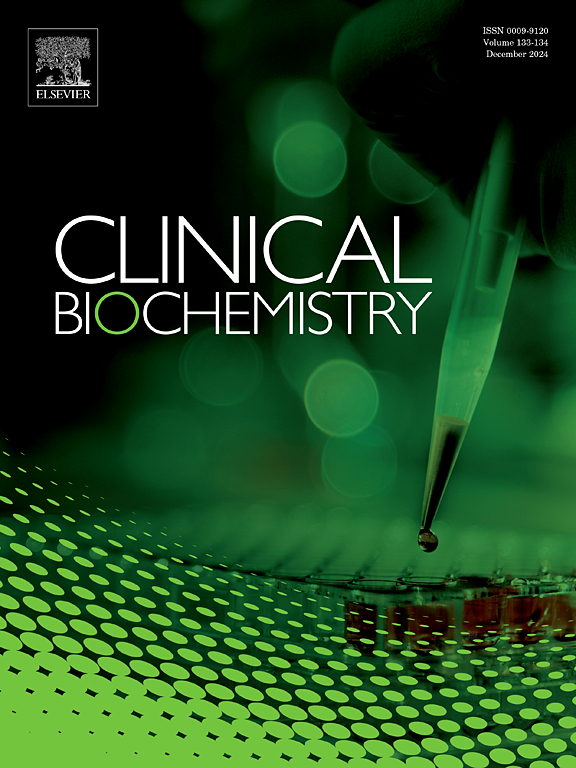Clinical implementation and outcome evaluation of dihydropyrimidine dehydrogenase (DPYD) pharmacogenomic testing for fluoropyrimidine dosing in a Canadian Provincial Healthcare center
IF 2.1
3区 医学
Q2 MEDICAL LABORATORY TECHNOLOGY
引用次数: 0
Abstract
Background
5-Fluorouracil (5-FU) and its pro-drug, capecitabine, are widely used to treat solid tumors. Patients with dihydropyrimidine dehydrogenase (DPYD) deficiency are at increased risk for severe treatment-related toxicity. This study reported the implementation of DPYD genotyping in clinical practice and assessed the impact of genotype-guided dosing on clinical outcomes.
Methods
An in-house pharmacogenomic testing using the Elucigene DPYD genotyping kit (Yourgene Health, UK) was established to detect the four most common clinically actionable DPYD alleles, including *2A, *13, HapB3 and c.2846A>T (rs67376798). Six months post-implementation, a retrospective chart review assessed genotype results, chemotherapy regimens, dose modifications, adverse events related to 5-FU or capecitabine, and demographics. Data were de-identified for analysis.
Results
Analytical validation of the DPYD assay showed 100 % sensitivity, specificity, accuracy, reproducibility, and repeatability. The genotyping workflow was successfully integrated into clinical practice, with a rapid turnaround time to meet oncology treatment planning. From July to December 2024, 299 patients underwent DPYD testing; variants were identified in 22 patients, including 20 patients (6.7 %) with clinically significant variants conferring a reduced DPD function and 2 patients with a variant (c.483 + 18G>A; rs56276561) that retains normal DPD function. Among those variants, HapB3 (n = 18) was the most frequent one, characterized by c.1129-5923C>G and c.1236G>A (rs75017182, rs56038477) co-occurring with c.483 + 18G>A (rs56276561). Of 233 patients receiving 5-FU-based chemotherapy, 13 were variant carriers. Genotype-guided dosing allowed early dose optimization, and all carriers completed at least three treatment cycles, with one severe adverse event attributed to oxaliplatin rather than 5-FU.
Conclusions
This study reported the integration of DPYD pharmacogenomic testing into oncology care and evaluated the post-implementation clinical outcomes, highlighting the critical role of pharmacogenomic testing in optimizing cancer treatment and improving patient safety.
二氢嘧啶脱氢酶(DPYD)药物基因组学检测氟嘧啶剂量在加拿大省级卫生保健中心的临床实施和结果评估
5-氟尿嘧啶(5-FU)及其前药卡培他滨被广泛用于治疗实体肿瘤。二氢嘧啶脱氢酶(DPYD)缺乏症患者发生严重治疗相关毒性的风险增加。本研究报道了DPYD基因分型在临床实践中的实施,并评估了基因型指导给药对临床结果的影响。方法采用英国Yourgene Health公司的Elucigene DPYD基因分型试剂盒进行内部药物基因组学检测,检测临床最常见的4个DPYD等位基因,包括*2A、*13、HapB3和c.2846A>T (rs67376798)。实施后6个月,回顾性图表回顾评估基因型结果、化疗方案、剂量调整、与5-FU或卡培他滨相关的不良事件以及人口统计学。数据去识别以供分析。结果DPYD检测方法具有100%的灵敏度、特异性、准确性、重现性和重复性。基因分型工作流程已成功整合到临床实践中,具有快速的周转时间以满足肿瘤治疗计划。2024年7月至12月,299例患者接受了DPYD检测;在22例患者中发现了变异,其中20例(6.7%)具有临床意义的变异,赋予DPD功能降低,2例具有保持正常DPD功能的变异(c.483 + 18G> a; rs56276561)。在这些变异中,HapB3 (n = 18)最为常见,其特征为c.1129-5923C>;G和c.1236G>A (rs75017182, rs56038477)与c.483 + 18G>A (rs56276561)共发生。在233名接受5- fu化疗的患者中,13名是变异携带者。基因型引导给药允许早期剂量优化,所有携带者完成至少三个治疗周期,其中一个严重不良事件归因于奥沙利铂而不是5-FU。本研究报道了将DPYD药物基因组学检测整合到肿瘤治疗中,并评估了实施后的临床结果,强调了药物基因组学检测在优化癌症治疗和提高患者安全方面的关键作用。
本文章由计算机程序翻译,如有差异,请以英文原文为准。
求助全文
约1分钟内获得全文
求助全文
来源期刊

Clinical biochemistry
医学-医学实验技术
CiteScore
5.10
自引率
0.00%
发文量
151
审稿时长
25 days
期刊介绍:
Clinical Biochemistry publishes articles relating to clinical chemistry, molecular biology and genetics, therapeutic drug monitoring and toxicology, laboratory immunology and laboratory medicine in general, with the focus on analytical and clinical investigation of laboratory tests in humans used for diagnosis, prognosis, treatment and therapy, and monitoring of disease.
 求助内容:
求助内容: 应助结果提醒方式:
应助结果提醒方式:


